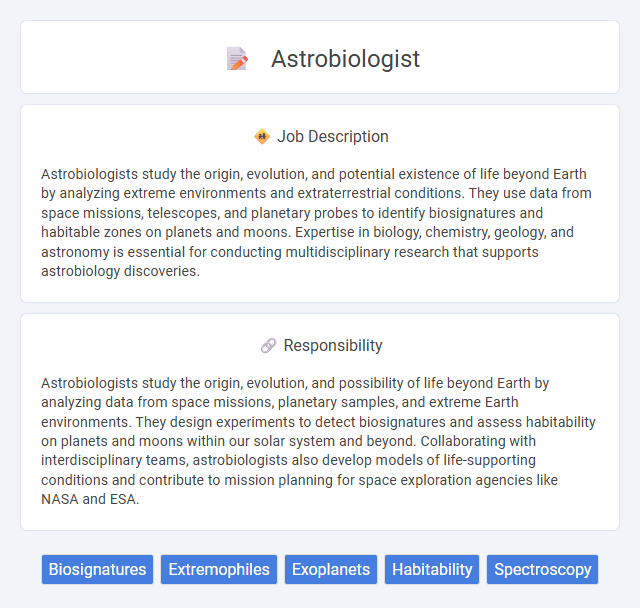
Astrobiologists study the origin, evolution, and potential existence of life beyond Earth by analyzing extreme environments and extraterrestrial conditions. They use data from space missions, telescopes, and planetary probes to identify biosignatures and habitable zones on planets and moons. Expertise in biology, chemistry, geology, and astronomy is essential for conducting multidisciplinary research that supports astrobiology discoveries.
Astrobiologists are likely to thrive if they possess strong analytical skills, a deep curiosity about life beyond Earth, and resilience to work in highly specialized and sometimes isolated research environments. Individuals comfortable with long hours of data analysis, fieldwork in extreme conditions, and cross-disciplinary collaboration may find this career highly suitable. Those who prefer routine tasks or minimal scientific ambiguity might face challenges adapting to the dynamic and uncertain nature of astrobiology research.
Qualification
Astrobiologists typically hold advanced degrees in biology, chemistry, or planetary science, with a strong foundation in molecular biology, biochemistry, and geology. Proficiency in laboratory techniques, data analysis, and experience with space missions or telescopic observations enhances their qualifications. Expertise in interdisciplinary research combining biology and space sciences is essential for investigating life potential beyond Earth.
Responsibility
Astrobiologists study the origin, evolution, and possibility of life beyond Earth by analyzing data from space missions, planetary samples, and extreme Earth environments. They design experiments to detect biosignatures and assess habitability on planets and moons within our solar system and beyond. Collaborating with interdisciplinary teams, astrobiologists also develop models of life-supporting conditions and contribute to mission planning for space exploration agencies like NASA and ESA.
Benefit
Astrobiologists likely gain unique insights into the origins and potential existence of life beyond Earth, enhancing scientific understanding and curiosity. This career probably offers opportunities to work with advanced technology and participate in groundbreaking space missions. Job prospects may include collaboration with international space agencies, providing a stimulating and innovative work environment.
Challenge
Astrobiologist roles likely involve overcoming significant challenges related to understanding the origins of life in extreme environments beyond Earth. The work probably demands expertise in interdisciplinary fields such as biology, chemistry, and planetary science to analyze complex data from space missions and laboratory experiments. Navigating uncertainties in detecting biosignatures and interpreting extraterrestrial environments could present ongoing obstacles in this evolving field.
Career Advancement
Astrobiologists can advance their careers by gaining expertise in planetary science, microbiology, and astrophysics, leading to research leadership roles or academic tenureships. Developing skills in data analysis, space mission instrumentation, and grant writing enhances prospects for securing funding and heading interdisciplinary projects. Networking within scientific organizations such as NASA and publishing in peer-reviewed journals are crucial steps toward establishing authority and achieving senior positions in astrobiology.
Key Terms
Biosignatures
Astrobiologists specializing in biosignatures analyze chemical, isotopic, and morphological indicators in extraterrestrial environments to detect potential signs of past or present life. Their research includes studying planetary atmospheres, surface materials, and subsurface samples from missions to Mars, icy moons like Europa, and exoplanets. Advanced techniques such as spectroscopy, mass spectrometry, and remote sensing are employed to identify biosignatures that differentiate biological processes from abiotic phenomena.
Extremophiles
Astrobiologists specializing in extremophiles study microorganisms that thrive in Earth's most inhospitable environments, such as hydrothermal vents, acidic hot springs, and deep subsurface rocks, to understand potential life on other planets. Their research provides critical insights into biosignatures and survival mechanisms that inform the search for life on Mars, Europa, and exoplanets with extreme conditions. By analyzing extremophiles' biochemical adaptations, astrobiologists develop models of planetary habitability and guide mission designs for space exploration.
Exoplanets
Astrobiologists specializing in exoplanets study the conditions on planets outside our solar system to determine their potential for harboring life. They analyze atmospheric composition, surface temperatures, and orbital characteristics using data from telescopes and space missions. Their research supports the identification of habitable zones and informs the search for biosignatures in distant worlds.
Habitability
Astrobiologists specializing in habitability study the conditions that make planets and moons capable of supporting life, analyzing factors such as atmospheric composition, water presence, and temperature ranges. They utilize data from space missions and telescopes to assess exoplanetary environments, focusing on biosignatures and planetary geology. This research helps identify potentially habitable worlds and guides the search for extraterrestrial life within the habitable zone of stars.
Spectroscopy
Astrobiologists specializing in spectroscopy analyze the interaction of light with matter to detect chemical signatures and organic compounds on celestial bodies. Utilizing advanced spectroscopic instruments, they examine planetary atmospheres and surface materials to identify potential biosignatures and assess habitability conditions. Their work supports the search for extraterrestrial life by interpreting spectral data collected from telescopes and space missions.
 kuljobs.com
kuljobs.com